25 Mar 2015 | Magazine, mobile, Volume 44.01 Spring 2015
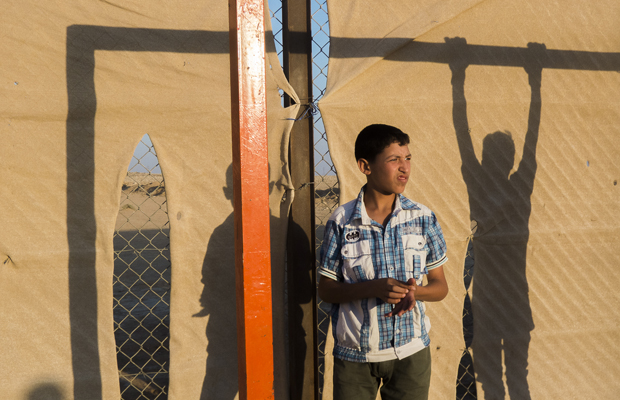
A picture from the Do You See What I See project which teaches photography skills to young refugees, Zaatari camp, Jordan (Credit: Mohamed Soleman/Do You See What I See)
In an article from the refugee voices special issue of Index on Censorship Magazine, Jason DaPonte looks at how migrants are using technology to keep in touch with distant relatives, and the security risks this can bring
“My wife changes her sim card every week,” said Omid, an Iranian refugee who hasn’t seen his wife in the seven years he has been awaiting a decision in his UK asylum case. The couple use Viber, a mobile app that allows free voice calls over the internet, but his wife remains in constant fear of surveillance. Omid is wanted by the Iranian state for political offences. He’s also a convert to Christianity and his wife fears discussing his new religion, as even members of his own family have branded him an infidel.
Refugees may be some of the most excluded people in society, but social media and new technology nevertheless play a crucial role in many of their lives. Across the globe, refugees are finding ways of using them to stay connected to families, homelands and political causes, in ways they couldn’t have a decade ago – even though it can have security implications. A number of refugees, particularly from Syria, suggested they use the free messaging mobile app, WhatsApp, because they believe the messages are secure. Whether WhatsApp messages can be hacked or intercepted is not clear, however.
Ismail Einashe, a British journalist and Africa expert, originally from Somaliland, explained another way social media is changing the refugee experience. He said how his teenage cousin, who fled Somaliland for Austria, uses Facebook for photo-sharing, to craft an image of success and happiness. But this can potentially hide the true difficulties of refugee life.
“My cousin is inspired by American hiphop. He wears baseball caps and baggy jeans – so his friends at home see the glamorous ‘other’ and they don’t see the high unemployment or poverty among refugees. It’s partly encouraging the young generation. Before, people didn’t see what life on the other side could be and now they can see it,” he told Index.
Nearly every refugee interviewed for this article said that free calls on Skype and the ability to connect with relatives for free using standard social platforms (like Facebook) is invaluable to them. But for some, sharing stories from exile goes beyond simple messaging and status updates. Some refugees use blogs and social media channels to publish content banned at home to try to fight the repression they escaped.
Moses Walusimbi fled Uganda’s anti-gay laws for The Netherlands and now runs Uganda Gay On Move – a blog, Facebook and Twitter movement that helps gay Ugandans and Africans who have fled persecution, as well as providing information for those who are left behind and remain under threat.
“When I came to Holland, I realised the more you keep quiet the more you suffer,” Walusimbi told Index. “I was very eager to know if there were any other Ugandans who are in Holland who are like me, in the same situation. And when I started these social media things, many Ugandans responded.”
His movement now has almost 9,000 followers on Facebook, which he says is the most popular platform for his content. He also has followers on Twitter and his blog. Uganda Gay On Move is providing a support network that goes beyond publishing, with many photos of meetings between its members for social and political reasons.
“Uganda Gay On Move is like a family to us now. It’s like a family because we come together, we discuss, we find solutions,” said Walusimbi. These solutions have included the group petitioning and lobbying the Dutch parliament to raise awareness about the denial of the human rights of gay Ugandans and other Africans. It also publishes information that helps asylum-seekers manage their cases and gather evidence. But Walusimbi still worries about those in Uganda who could face jail sentences simply for reading it.
“Ugandan LGBTI people – unless well-known human rights defenders – tend to use false names on Facebook. There is also a danger when people attend internet cafes and do not securely log off. There is also a danger – and I have had several direct reports of family or friends seeing the Facebook pages left open on computers in homes. Some people have been exposed this way,” Melanie Nathan, an LGBTI activist and publisher who has worked closely with African LGBTI movements, told Index. “Using Facebook could result in meetings or revealing real names through trust and then in entrapment.” Walusimbi corroborated that there are real cases where this has happened.
Blogs by and for refugees from various conflict zones are building audiences. The Medeshi Somaliland blog is one example. It was founded with a desire to keep in touch with a dispersed family and diaspora in 2007 by Mo Ali, who left Somaliland to seek asylum in the UK in 2004. His work of aggregating and creating new content quickly became more political.
“There are many websites about Somaliland and those who are publishing there have been harassed by the police. They’ve been ordered to shut down because of being critical of the government on freedom of speech and press,” Ali told Index, saying he knows of at least three websites that have been shut down and explaining why he has to publish from abroad.
Even publishing from the UK, he doesn’t feel totally safe, “I’ve received death threats via email but I published the threat online and nothing happened. I’m still alive. It was just intimidation.”
Like Uganda Gay On Move, Ali has used the blog’s following to campaign, and in 2010 and 2012 rallied more than 1,000 of his followers to lobby outside London’s Parliament for official recognition of Somaliland.
Refugees are working on their own and with professional content and software creators to find bespoke ways to tell their stories. Dadaab Stories and the related Refugee News are two of the most elegant projects that have used the power of free social media tools (particularly Tumblr and YouTube) to help refugees publish stories. In these cases, professional filmmakers and refugees worked together to create ongoing social media coverage of the refugee camp for Somalians in Kenya.
Globally available and free technology platforms are helpful, but tools, platforms and projects are now emerging that are specifically aimed at refugees to allow them to self-organise and connect digitally.
Refunite is a social network designed to connect dispersed families that have low access to technology following displacement. It allows refugees to remain anonymous to everyone other than their family members, which aids those who may not be able to register with formal institutions because they are awaiting asylum decisions or are stateless. The platform currently reaches more than 500,000 refugees and is aiming to connect 1 million during 2015. It is geared towards low-end mobile technology to ensure that nearly anyone can use it. It can even be accessed using an interactive voice response system or text-messaging for those who are illiterate or don’t have internet access.
Low-cost and low-barrier-to-entry technologies such as these are proving to be a key part of connecting refugees in crisis. The UNHCR is telling the world the story of Jordan’s Zaatari camp via Twitter (which has claimed to be the first refugee camp with an official Twitter account). Nasreddine Touaibia, a UNHCR communications associate at the camp described how WhatsApp, a free or low-cost mobile messaging system, is being used by Syrian refugees to self-organise. “Urgent messages are sent to these groups and they are reflected in the Facebook group later. It’s their own emergency broadcast network,” he told Index, describing how WhatsApp had been used to give warnings when flooding occurred at the camp.
South African technology startup Vumi is now trying to build on this trend of using low-cost messaging services to create technical products that can empower refugees to self-organise at scale. Its platform uses mass mobile messaging and low-fi browsing to enable access to civic information.
Building on its success in Libya of technically enabling Wikipedia Zero (a Wikipedia Foundation project which gives access to Wikipedia without data charges in 35 countries) and distributing voter information, the company is now in the planning stages for a project focussed on empowering refugees, in partnership with South Africa’s Lawyers for Human Rights, an NGO that deals largely with refugees in South Africa.
Various NGOs and other services are also using social media to provide platforms that help refugees re-settle. These are largely regionally based and aim to help refugees understand the legal and social contexts they are in. In the UK, the Refugee Council and Bail for Immigration Detainees provide online resources and tools that help refugees build and understand their legal cases. Migrant Voice, another UK-based organisation, provides training and tools to allow migrants (including refugees) to publish and communicate their stories.
Refugees and migrants certainly benefit from the uses of social media that everyone with internet access does; but the emerging platforms in the space are where the traditional model of solitary, isolated migrants can be disrupted. Tools specifically tailored to the needs of the excluded have the potential to create the most significant change in a networked world.
To read other articles from the issue, subscribe to the magazine in print, iPad, or phone find out more here or on iTunes, search for “Index on Censorship”.
This article and photograph is part of Across the wires, the spring 2015 issue of Index on Censorship magazine, and should not be reproduced without permission of the magazine editor. Follow the magazine on @Index_magazine
© Jason DaPonte
16 Jan 2015 | Europe and Central Asia, Guest Post, News and features
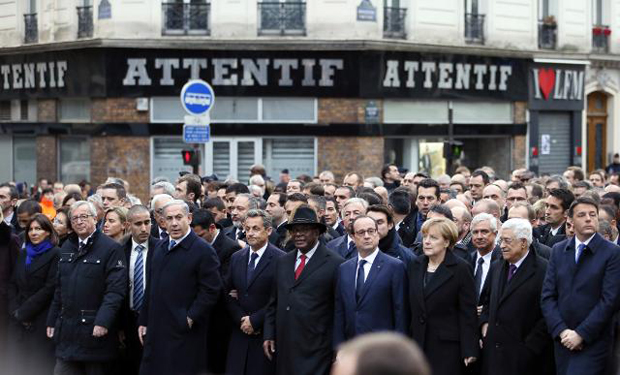
World leaders march in Paris following the recent attacks in France (Photo: European Council)
Jacob Mchangama is the founder and executive director of Justitia, a Copenhagen-based think tank focusing on human rights and the rule of law. He has written and commented on human rights in international media including Foreign Policy, Foreign Affairs, The Economist, BBC World, Wall Street Journal Europe, MSNBC, and The Times. He has written and narrated the short documentary film “Collision! Free Speech and Religion”. He tweets @jmchangama
The brutal attack against Charlie Hebdo has seen European leaders rally round the fundamental value of freedom of expression.
French President Francois Hollande led the way by stating: “Today it is the Republic as a whole that has been attacked. The Republic equals freedom of expression.” Prime Minister David Cameron vowed that Britain will “never give up” the values of freedom of speech, and German Chancellor Angela Merkel called the events in Paris “an attack on freedom of expression and the press — a key component of our free democratic culture.” European Union President Donald Tusk stressed that “the European Union stands side by side with France after this terrible act. It is a brutal attack against our fundamental values, against freedom of expression which is a pillar of our democracy.”
This unified commitment to freedom of expression is both admirable and crucial in the aftermath of the killing of cartoonists armed with nothing more than ink, humour and courage. It is also true that freedom of expression is a fundamental European value and that (Western) Europe allows for a much freer debate than most other places in the world. However, European governments and institutions have long compromised this freedom through statements and laws that narrow the limits on permissible speech. Ironically some of these statements and laws target the very kind of offence that Charlie Hebdo excelled in.
Donald Tusk’s principled defence of freedom of expression stands in stark contrast to a 2012 joint statement issued by then EU High Representative for Foreign Affairs Catherine Ashton, as well as the Organisation of Islamic Cooperation and the Arab League that “condemn[ed] any advocacy of religious hatred … While fully recognising freedom of expression, we believe in the importance of respecting all prophets”. The statement followed the furore over the crude anti-Islamic film “The Innocence of Muslims”, and suggests that mocking prophets is tantamount to religious hatred prohibited under international human rights law and thus exempted from the protection of freedom of expression.
The controversy over The Innocence of Muslims prompted none other than Charlie Hebdo to print its own depictions of Mohammed, including one showing Islam’s prophet naked. That decision drew stern condemnations from the French government. Then Foreign Minister Laurent Fabius remarked that “in the present context, given this absurd video that has been aired, strong emotions have been awakened in many Muslim countries. Is it really sensible or intelligent to pour oil on the fire?”
While Charlie Hebdo has won a number of lawsuits other French figures have been convicted or censored under French law. Last year comedian Dieudonné M’bala M’bala was banned from performing his comedy shows publicly, due to their anti-semitic content. And France is not alone. Swedish shock artist Dan Park was sentenced to six months imprisonment in 2014, over a number of purportedly racist posters deemed “gratuitously offensive” to minority groups by a Swedish court. The owner of the gallery that had displayed the cartoons was also convicted and the posters ordered destroyed.
In 2011, a prominent Austrian Islam-critic was convicted of “denigration of religious beliefs” for stating that the prophet Mohammed “had a thing for little girls”. An elderly Austrian man was found guilty of the same offence for yodelling while his Muslim neighbour was praying. In the United Kingdom, an atheist who left caricatures of the Pope, Mohammed and Jesus in a prayer room in John Lennon Airport was similarly convicted and sentenced to six months imprisonment, though the sentence was suspended. A TV personality’s disparaging social media comments about Scotland and Scots recently prompted Scottish police to tweet that it would “thoroughly investigate any reports of offensive or criminal behaviour online and anyone found to be responsible will be robustly dealt with”.
France and numerous other European countries also have bans against Holocaust denial. In 2010, a Muslim group claiming to expose free speech double standards in the aftermath of the Danish cartoon controversy was convicted after publishing a cartoon suggesting that Jews have made up the Holocaust.
When it comes to countering terrorism, European states increasingly target not only expression that incites terrorism but also expression that may constitute “glorification”. Exactly a week after the attack against Charlie Hebdo, Dieudonné once again ran afoul of the law and was detained over a Facebook post. According to Le Monde at least 50 other cases of terror apology have been opened against people in France since the attack. In Denmark, a number of Islamists have been prosecuted for glorifying terrorism following Facebook postings that seemingly approved of terrorism, including the assault on Charlie Hebdo. Recently British Home Secretary Theresa May unveiled plans that would ban “non-violent extremists” from using television and social media to spread their ideology.
While Europe has a sophisticated and elaborate regional system for the protection of human rights, these institutions have frequently sided with the censors over citizens. In 2008 the EU adopted a framework decision obliging all member states to criminalise certain forms of hate speech. The European Court of Human Rights has found the confiscation of a “blasphemous” film, the conviction of a French cartoonist mocking the victims of 9/11, and the banning of religious fundamentalist group Hizb-ut-Tahrir compatible with freedom of expression. The Council of Europe’s current High Commissioner for Human Rights Nils Muižnieks, has called for all 47 member states to enact bans against Holocaust denial and gender based hate speech.
These non-exhaustive examples demonstrate that contemporary Europe’s approach to freedom of expression is far more complicated and far less principled than the statements made by its leading politicians in recent days suggest. It is an approach to freedom of expression based on the premise that social peace in increasingly multicultural societies requires restrictions on freedom of expression in order to avoid offending ethnic and religious groups. Thus in 2004, when Dutch film maker Theo Van Gogh was murdered by an Islamist offended by Van Gogh’s controversial and anti-Islamic film “Submission”, the Dutch minister of justice proposed to revive the country’s blasphemy law which had been disused since 1968. He argued that “if opinions have a potentially damaging effect on society, the government must act … It is not about religion specifically, but any harmful comments in general.”
Such sentiments might appeal to pragmatists in the wake of the tragedy in France. But there is little reason to think that restricting freedom of expression fosters tolerance and social cohesion across a Europe increasingly divided along ethnic and religious lines, and where anti-semitism and other forms of intolerance is on the rise. In fact such laws seem to fuel the feeling of separateness of modern Europe by legally protecting group identities against offence rather than fostering an identity rooted in common citizenship. While minorities may be offended by disparaging comments, insisting that freedom of expression be limited to protect them from racism and offence, is a very dangerous game at a time where far-right movements with questionable commitment to liberal democracy are on the rise. In this context it should not be forgotten that Dutch politician Geert Wilders once proposed banning the Quran and that the leader of Front National Marine Le Pen wants to ban religious head wear, including the Jewish kippah. The freedoms that (sometimes) allow bigots to bait minorities are also the very freedoms that allow Muslims and Jews to practice their faiths freely. By further eroding these freedoms, no one is more than a political majority away from being the target rather than the beneficiary of laws against hatred and offence. Only by reaffirming a genuine and principled defence of freedom of thought, expression and religion can Europe hope to create a society built on real tolerance and respect for diversity, and where cartoonists neither have to fear gunmen nor jail, but only the moral judgment of their fellow citizens.
This guest post was published on 16 January 2015 at indexoncensorship.org
10 Nov 2014 | China, News and features, Tibet
![Photo: Wolfgang H. Wögerer, Vienna, Austria [CC-BY-SA-3.0 (http://creativecommons.org/licenses/by-sa/3.0) or CC-BY-SA-3.0 (http://creativecommons.org/licenses/by-sa/3.0)], via Wikimedia Commons](https://www.indexoncensorship.org/wp-content/uploads/2014/11/Vienna_2012-05-26_-_Europe_for_Tibet_Solidarity_Rally_158_Lobsang_Sangay.jpg)
Lobsang Sangay at a solidarity rally for Tibet in 2012 (Photo: Wolfgang H. Wögerer, Vienna, Austria [CC-BY-SA-3.0 or CC-BY-SA-3.0], via Wikimedia Commons)
It was not, to say the least, what he had been expecting. Just a few weeks earlier, Sangay had become Tibet’s new political leader, taking over all political authority from the Dalai Lama after winning an election held among exiled Tibetans all across the world. It had been his first day in parliament in Dharamsala, where the Central Tibetan Administration (CTA) is based, and his entire cabinet had just been unanimously approved — a cause for celebration.
Yet that same day, a top-secret memo about an upcoming visit to the US had somehow been obtained from the government’s computers, and leaked into the public domain. “Everything was supposed to be very confidential, and the memo was only meant for three people in Washington DC,” Sangay tells Pao-Pao.
His assistants recommended cancelling the trip altogether. “It’s all out,” they told Sangay. “Nothing is a secret.” Their worries were not unwarranted. The Chinese government had started pressuring the American politicians listed in the memo to cancel their meeting with Sangay. Still, he pushed ahead. “I said: ‘We are going to Washington DC, on the same dates as described in the memo, and we are meeting with the same people as in the memo. That’s the only way we can respond to Beijing’s bullying.’”
Security upgrade
In the end, the visit went ahead as planned. But the attack was a shock to Sangay. “First of all, that Beijing is so capable of penetrating our computers that they can get at even our very confidential memos,” he says. “But also, that when I came back to the office, they were logging into every computer in the office and trying to shut it down, trying to track down which computer was affected with a virus and how they stole the secret memo. The whole place was shut down.”
It wasn’t the first time that the Tibetan administration had found itself under Chinese cyber attack. In 2008, the large-scale cyber spying operation Ghostnet managed to extract emails and other data from the CTA. Ghostnet also affected other Tibet-related organisations, as well as embassies and government organisations across the world. A year later, ShadowNet was employed, which researchers from the Infowar Monitor (IWM) at the University of Toronto called a form of “cyber espionage 2.0”.
The IWM researchers were able to establish that the hackers worked from within China, but they have been hesitant to link these hackers to the Chinese government due to a lack of direct evidence. However, an American cable released by Wikileaks describes a “sensitive report” that was able to establish a connection between the attackers’ location and the Chinese army.
The 2011 attack propelled Sangay to tighten the administration’s digital security. “At the time, there was a different mindset about it: ‘Oh, we can’t do much about it, Beijing can do whatever it wants,’” he recalls. Sangay, who was an outsider to Tibetan politics and had spent the sixteen years before he was elected at Harvard Law School, didn’t agree. “I thought that we could upgrade our security to a certain level. Now, even if we have a virus, it’s only on one computer, we can isolate it.”
But while the CTA’s office might no longer grind to a halt when a computer is infected, attacks have continued unabated. In 2012, a Chinese cyber attack infiltrated at least 30 computer systems of Tibetan advocacy groups for over ten months. In 2013, the CTA’s website Tibet.net was compromised in a so-called watering hole attack, which allows hackers to spy on and subsequently attack website visitors.
Greg Walton, an internet security researcher at Oxford University, is concerned at the growing number of these watering hole attacks. When they are combined with attacks that exploit software vulnerabilities, he argues that “there is essentially no defence for the end user, and no amount of awareness or training will mitigate the threat.”
Sangay does not believe that absolute security is possible. “Beijing is still, I am sure, trying to steal things. And I am sure they are successful, in some sense. But we also have to try to make it a little more difficult,” he says. “I assume my email is being read on a daily basis. The Pentagon, the CIA, multinational companies are all being hacked, and they are spending hundreds of millions to protect themselves.”
Sangay throws up his hands: “Poor me! My administration’s budget is around 50 plus million dollars. Even if I would spend my whole budget to protect my email account, that still wouldn’t be enough.”
No attachment, please
Sangay does believe that many problems can be avoided with a few basic precautions. He uses very long passwords for instance, and changes them often to prevent hacks of his own email account. And, he says: “You always have to follow Buddha’s message. What would Buddha say if you send him an email? ‘No attachment please!’” Sangay laughs. “One of the cardinal sins in Buddhism is attachment. Well, Buddha’s lessons, who said that 2,500 years ago, are still valid.”
Holding himself to “Buddha’s teachings” has prevented Sangay from getting his computer infected many times — although there have been some close calls. Take for example the time Time magazine’s editor Hanna Beech emailed him, a week prior to a scheduled interview in Dharamsala.
“She sent me the ten questions she would ask me. I found that very generous, journalists sending me questions ahead of time!” Sangay was about to download the attachment — but then he paused. “I grew a bit suspicious, so I decided to write back to her to ask if it was really her.” Beech said it wasn’t.
The attack was sophisticated, but not uncommon, Sangay says. “We get that on a daily basis, literally; some Tibetan support group or someone from our office sends an email that will contain a virus.”
Strengthening bonds
For the Tibetan government, digital communications have offered Chinese hackers a welcome point of attack. But Sangay also emphasises the positive sides of the internet: “Despite the [Great] Firewall, information breaks through, and is exchanged. That is happening, and that is not something that the Chinese government or any other government can prevent.”
He points to the 2008 protests in Tibet as one example. In the protests, which some dubbed “the cellphone revolution”, written reports, videos and photos from eyewitnesses were able to make their way to the rest of the world via mobile phones.
Additionally, the internet has allowed the Tibetan Central Administration in Dharamsala, home of about 100,000 Tibetans, to strengthen its bonds with the approximately 50,000 exiled Tibetans living elsewhere. Sangay says that the exile community — “scattered across some forty countries” — keeps in touch mainly through the internet.
“The internet has been very vital. The other day, I was speaking to Tibetans in Belgium. I asked them how many log in to Tibet.net, our website, and how many watch Tibetan online TV. About 40% raised their hands.” Tibetans from inside Tibet even manage to send Sangay “one-off messages” via Facebook from time to time. “Things like: ‘I wish you well’, from Facebook accounts that are immediately deleted.”
Dangerous, but helpful
Tibetans inside and outside of China now also communicate constantly via WeChat, but that is not without danger. A year ago, two monks in Tibet were arrested and jailed after posting pictures of self-immolations via the chat app. “Many say it’s very dangerous, because it’s an app by a Chinese company,” Sangay concedes. Still, he also considers it “very helpful and informative” as long as it is used to discuss safe topics.
The Tibetan administration consciously abstains from contacting Tibetans inside China “for fear that we might jeopardise them,” Sangay says. “We get a little less than 100,000 readers to our website every month, and we know many are from inside Tibet and China as well. We know it’s happening, but we really don’t make deliberate efforts [to contact them], and we also don’t keep track.”
Skyping with Woeser
Since Sangay was elected, it has been too risky for him to keep in touch with Tibetans in China via the internet. But before his election, like many others, he was in touch with those inside China almost every day. During his years at Harvard, he often Skyped with the famed Tibetan blogger and activist Tsering Woeser.
“It almost became an everyday ritual. I would go to the office, and then at a particular time I would log on and we would talk for half hour or more. Because her Tibetan wasn’t good, I became her unpaid, amateur Tibetan language teacher.” Sangay laughs as he recalls Woeser’s unsuccessful attempts to crack jokes in her — at the time — mediocre Tibetan.
Unfortunately, Sangay says he “had to stop talking to her for fear that I might endanger her”. But he still admires her work: “She is a good source of information. She compiles information from inside and shares with the rest of the world. She is very bold.” He considers bloggers like her an invaluable resource for those who want to know what life in Tibet is really like.
So will the internet ultimately be a force for good or evil? Sangay doesn’t know. “It all depends on who uses it. For good, if more good people use it.” On the one hand, he is in awe at how nowadays “in zero seconds, at almost zero cost, you can send vast volumes of information”. But he worries about the security side of the internet. “Ultimately, the [power] dynamic is so asymmetrical. One has wealth, and control over access to stronger and better technology, and one doesn’t.”
That, of course, is a power dynamic that the Tibetan leader has long ago gotten accustomed to. “I think the David and Goliath battle will go on, even on the internet,” Sangay says. “Ultimately, if David will prevail, we will have to see.”
This article is also available in Chinese at Pao-Pao.net
This article was posted on 10 November at indexoncensorship.org with permission from Pao-Pao.net
24 Jun 2014 | News and features, Politics and Society
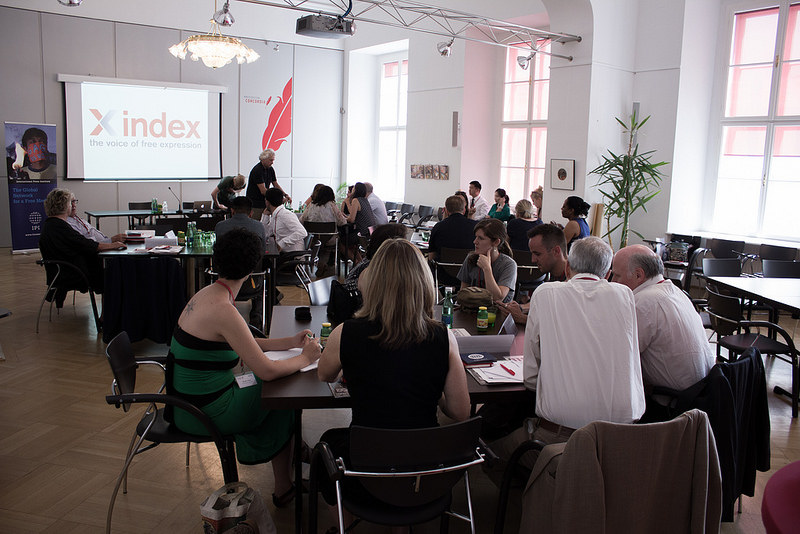
Index speaks at the IAPC meet 2014, Vienna
There has been an 18% rise in violence towards journalists compared to the same period last year, International Media Support, an organisation that works in many of the world’s biggest danger zones, told an international journalism conference.
News from Egypt – as three journalists from Al-Jazeera are sentenced to seven years in prison – demonstrates the huge threats that journalists can face. The subject was covered in detail at this year’s International Association of Press Clubs annual conference in Vienna, which Index on Censorship attended this month.
“Some countries we just can’t work in,” said John Barker from Media Legal Defence Initiative, who help represent journalists facing legal charges for reporting and presented on their work. “Every time we work in Vietnam, for example, the lawyers are arrested. In many places, we can’t transfer money to them.” Nonetheless, they are currently working on 102 cases in 39 countries.
Other topics for discussion included:
- The increasing number of freelancers working in danger zones – and with little training
- How to protect fixers, translators and local journalists
- Possible methods for funding legal representation (Crowdfunding worked as a recent experiment in Ethiopia, said MLDI)
The event was hosted by Austria’s PresseClub Concordia – said to be the oldest press club in the world (founded in 1859 – reformed in 1946, after having its assets seized by Nazis). It was attended by press clubs from around the world, including Poland, Belarus, Syria, the Czech Republic, the US, India, Ukraine, Mongolia, Germany, and Switzerland. Other NGOs – alongside Index, International Media Support and Media Legal Defence Initiative – included the International Press Institute and RISC (Reporters Instructed in Saving Colleagues).
Index was invited to present on the work the organisation is doing around the world, which included sharing the stories of our Freedom of Expression Awards winners and nominees, and news of our current work, including a crowdsourcing project to map media freedom violations across the EU. Plus we also shared stories from our quarterly magazine – including a report on violent threats to journalists in Tanzania and how news stories are getting out of Syria via citizen reports.
Index also hosted round-table discussion on censorship, which provoked an impassioned debate. One of the most interesting topics covered was on contracts that some journalists are being made to sign on what they can and can’t write. We heard of cases in Mongolia and Germany. We also discussed self-censorship and censorship by complying to advertisers’ will. One attendee from the Berlin Press Club said: “There is no censorship in Germany, but journalists feel like they have scissors in their heads. You have to self-censor before you write.” This is an area that we are researching, so please get in touch if you have experiences and examples.
The meeting also visited a new exhibition on censorship during WW1 and ended with the Concordia Press Club’s annual ball, which is a key fundraiser for the club and attended by over 2,000 guests. See photos from the event below.
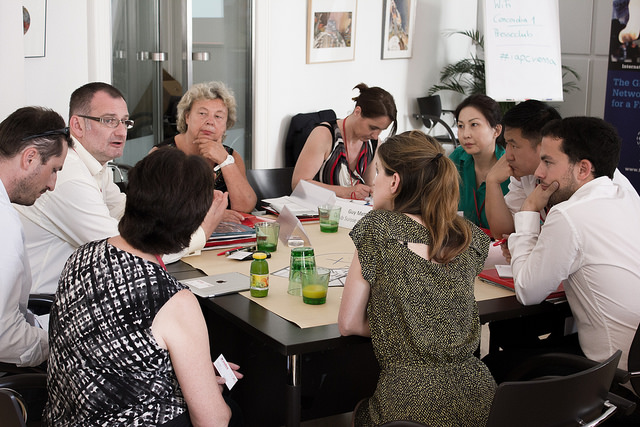
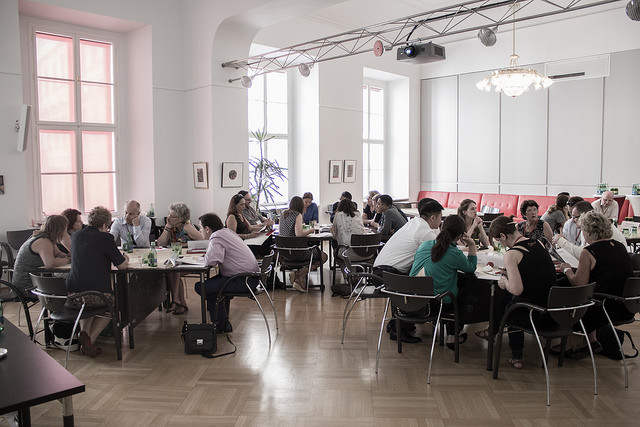
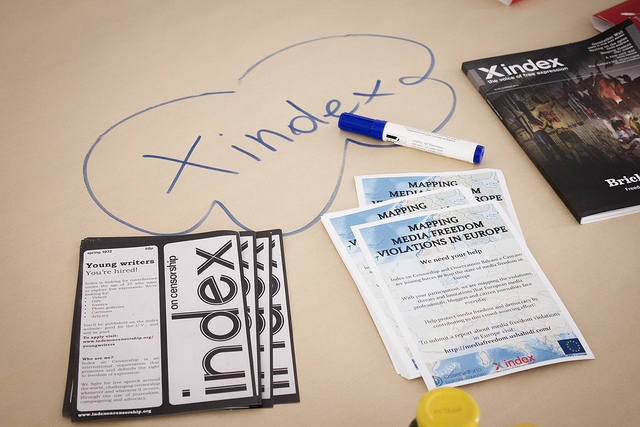
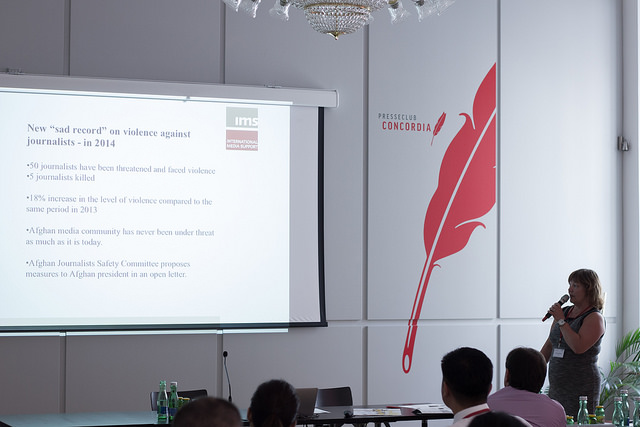
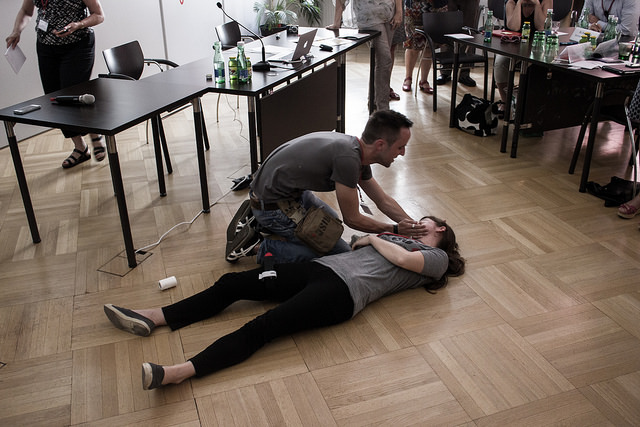
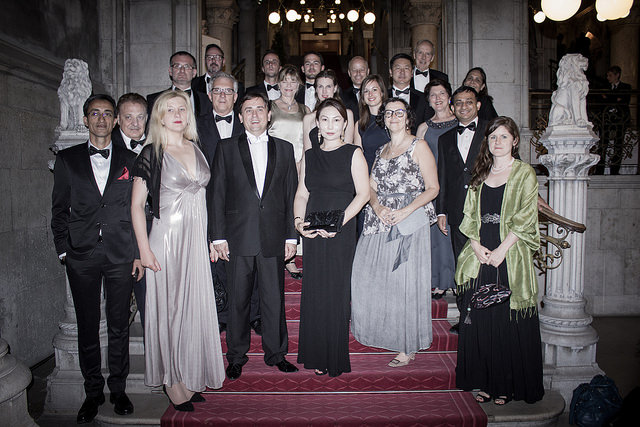
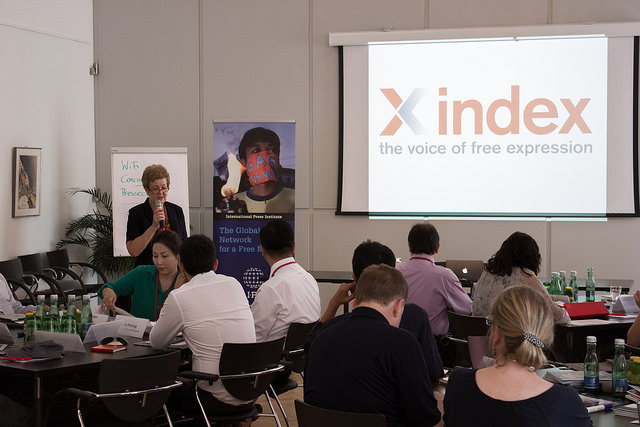
This article was posted on June 24, 2014 at indexoncensorship.org



![Photo: Wolfgang H. Wögerer, Vienna, Austria [CC-BY-SA-3.0 (http://creativecommons.org/licenses/by-sa/3.0) or CC-BY-SA-3.0 (http://creativecommons.org/licenses/by-sa/3.0)], via Wikimedia Commons](https://www.indexoncensorship.org/wp-content/uploads/2014/11/Vienna_2012-05-26_-_Europe_for_Tibet_Solidarity_Rally_158_Lobsang_Sangay.jpg)







